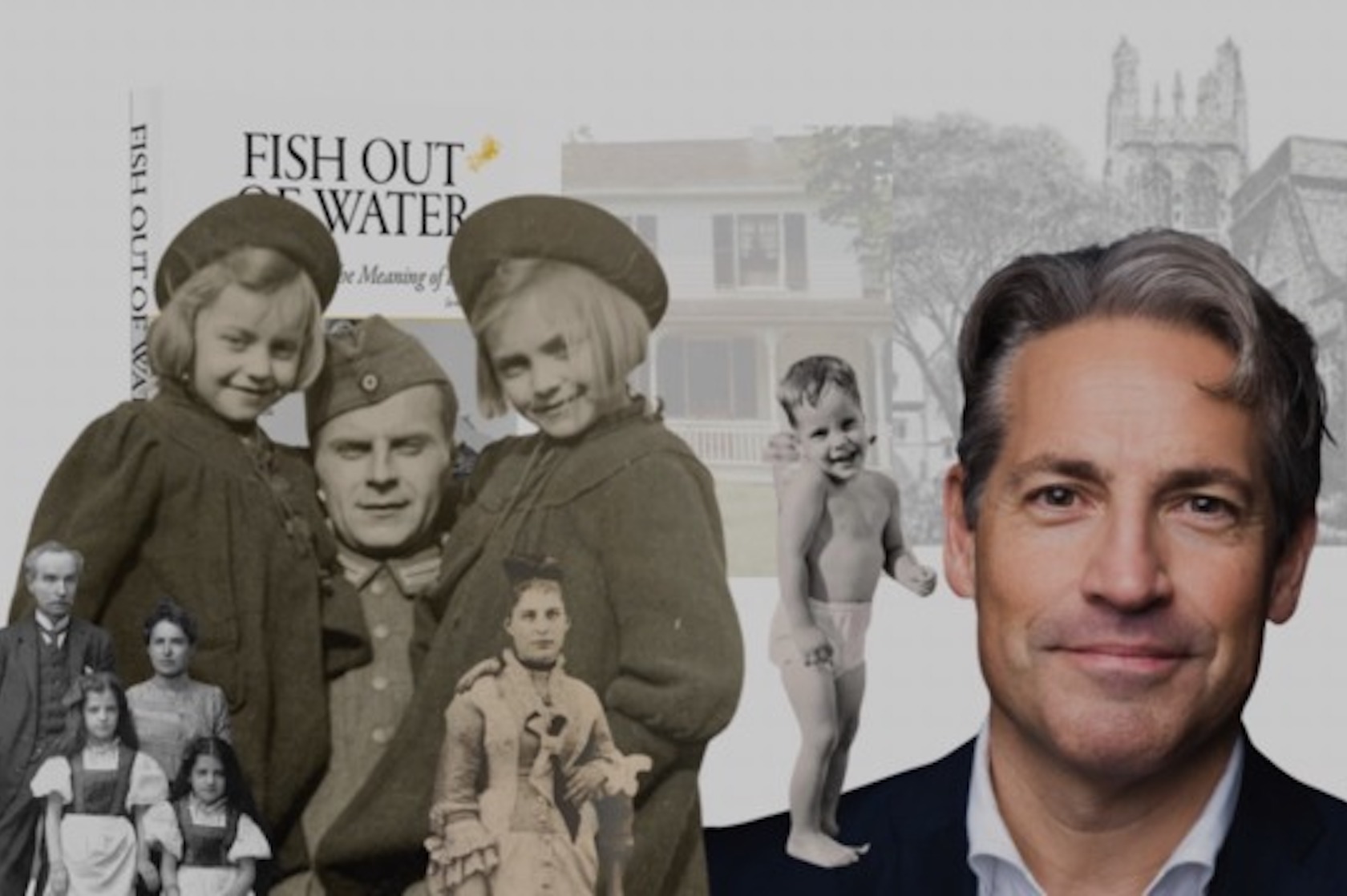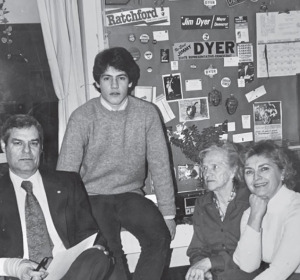An excerpt from “Fish out of Water”
February 8, 2022

This excerpt is from Chapter 15 in my book FISH OUT OF WATER: A Search for the Meaning of Life.
Because I hadn’t been raised in a culturally sophisticated atmosphere, college was for me much more than academics. For example, for the first time in my life I saw certain movies like Martin Scorsese’s Raging Bull and David Lynch’s The Elephant Man, both of which I still revere, the latter being almost shockingly Christian in its message. I also saw A Clockwork Orange, which I despised for the violence, and The Exorcist, which I despised more because it portrayed demonic evil so realistically, although in this it pushed me toward God. I knew evil existed, but actual satanic evil never came into the picture until I saw in that film the unspeakable horror and hopelessness of the real nightmare of a world without God or goodness or love. But precisely because Satan was less an entity of evil than a non-entity of God’s goodness, the film showed me in negative form something of the real thing against which Satan raged and rebelled. Through some of what I was reading I began to see that only God can create, and that Satan can only pervert what already exists of God’s good creation. In other words, Satan cannot stand on his own hooved feet, and if he presented any twisted reality, that reality was stolen from God. For some reason I cannot remember, my mother had given me a five-by-seven postcard of a Rembrandt, “Head of Christ,” which I had posted on my bulletin board, and I was so shaken that night after seeing that film that I looked at it and prayed.

My parents and grandmother visiting me at Trinity, 1980
As much as I loved my friends and the courses I was taking [at Trinity College] —never appreciating how rare such an education was becoming—I badly wanted to transfer to the sort of larger university I had always envisioned. Trinity had fewer students than my three-year high school and the preppy Gestalt was genuinely suffocating. Since I had been wait-listed at Yale and Dartmouth, they seemed the logical choices for possible transfer, but because I was still considering a life in politics—I assumed in Connecticut, since I lived there—I thought I should go to school there, too. So during spring break I applied to Yale. I needed two recommendations from professors, but the professors that first semester thought so well of me I thought I should ask all four for recommendations. Then I wrote my essay—in it pretentiously using the word “traumata”— and I sent it off with my application. And I prayed, believing God had a plan. I wouldn’t hear back until summer, and had no idea that if I went to Yale I would enter a world where reading books for themselves and for the eternal truths they contained had already ceased, and where academic trendiness was not the surprising exception, but the fatiguing rule. I only knew that it was my dream.
That summer I returned home. I had no idea whether I would get into Yale, but I remember one day driving down West Street toward City Hall and thinking that if I didn’t I would transfer someplace else, to Oxford or Cambridge or West Point. Even if it meant joining the French Foreign Legion, I couldn’t survive Trinity for four years. I wanted to strike out into the wide world, whatever that meant, to do something dramatic and important.
And then came my answer. It was late May and I had just come home for the summer. My mother was outside in the driveway when the mailman came, so I ran to the mailbox with the cutout of the birds and saw the large envelope and tore it open. I had never been so happy in my life, so I did something I had never done. I grabbed my forty-six-year-old mother, and swung her around in her sundress, over and over…
Like an impatient kid on Christmas morning, I wanted to get to Yale as soon as possible so I arrived the first day students were allowed to, finding myself alone in the vast suite to which I had been assigned. But slowly they arrived. They were all juniors and immediately made me feel more welcome than I could have dreamed. Already that weekend they invited me to join them in Puerto Rico for spring break, since two of them were pre-meds who lived there. And the following weekend they threw me a “coming out” party to introduce me to their friends—advertising it with a cartoon poster of me in a debutante’s gown, courtesy of my talented new artist friend Tom Fahsbender.
As the semester began two roommates were cast in the musical 1776, and they suggested I try out, which I did, being cast as John Hancock. I also was thrilled to begin working on the Yale Record, the campus humor magazine. It was as if I suddenly felt born to write comedy and only now was realizing it. And I got a part-time job shelving books in the funereal stacks of Sterling Memorial Library.
But none of my classes excited me especially, and whatever foundations were laid at Trinity were not built upon. I drifted from thinking about the deeper meaning of life until something like the opposite began to happen, as though I were being encouraged to think about the meaninglessness of life, though I hardly realized it.
That first semester I still snuck off to the weekly Christian meetings, but never felt comfortable. But in a phone call with John O’Brien that semester I learned that our genius friend Ian was no longer an atheist, but had become a Christian. I could hardly believe it, but I confirmed that it was indeed true, and it bolstered what flicker of faith I still had. But after spring break, I decided to stop attending the Christian group, yielding to my building repulsion toward them as uncool. I had chosen to trade up and hang with a cooler crowd, mostly of the literary and artsy set.
Soon after this decision, however, I heard Billy Graham was coming to campus. I was hugely excited, though it was his celebrity far more than his theology that attracted me, and if Gerald Ford or Dean Martin had come, I would have been just as excited. But on the evening he was to speak I saw something that knocked me for a decidedly unpleasant loop. I was in the Calhoun dining hall—probably recounting lines from The Little Rascals—when I glanced toward the door and saw something I couldn’t believe. The twenty or so Christians from the group I had quit were filing into the room, past the unpleasant Cerberus-like Sophie who checked our meal tickets as we entered—and who was with them? It was Billy Graham! They all disappeared into the private Fellows Lounge. I was instantly beside myself with jealousy and remorse, knowing that if I hadn’t left that group I would be having dinner with Billy Graham! That was the first and only time I felt I had made a mistake in leaving that group, and of course it was only for a selfish and superficial reason. But it certainly stung.
That evening his talk in Battell Chapel was so packed I was forced to find a seat in the balcony. I went by myself and don’t remember anything more than agreeing with whatever he said generally, but his familiarly sonorous voice and cadences made it all somehow distant. At the end when he prayed that we receive Jesus into our hearts I prayed along, just as I had many times watching him—or Pat Robertson or Jim Bakker—on TV, but as with all of those times, nothing magical happened, and that was the end of it. I went back to my world and didn’t give it another thought.
END.
To find out how the story ends, order your copy of Fish Out of Water: A Search for the Meaning of Life right here!
